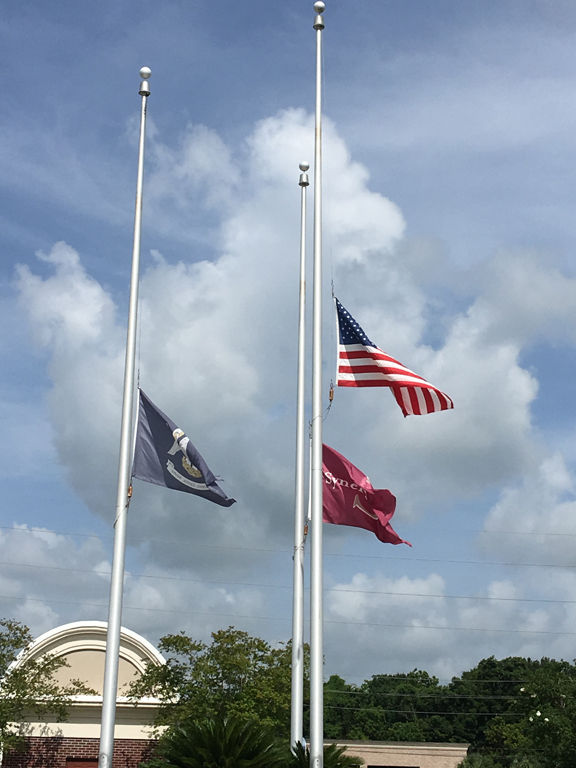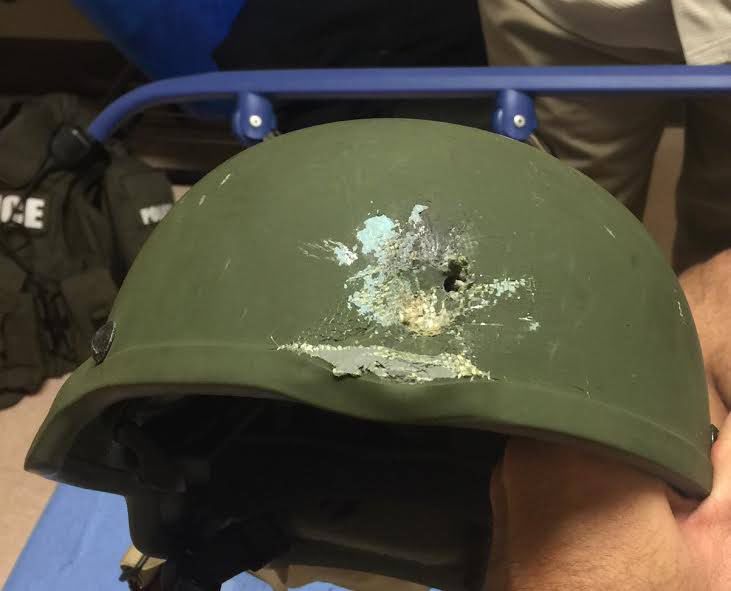LJ Adams
June 14, 2016
Orlando: Local signs of respect and efforts to help
June 16, 2016As federal, state and local agencies sift through the carnage in Orlando to learn more about the mindset of the man who slaughtered 49 people and wounded a few more than that, local lawmen are watching closely for clues that can keep Bayou Region communities safe.
Noting the fine line that exists between respect for individual freedoms and faithful ensuring of public safety, local sheriffs agree that more can be done to keep them abreast of potential local threats, not only from federal agencies that mine sensitive data but also from members of the public, who interact with potential problem people every day.
The Times interviewed local law enforcement executives in the wake of Sunday’s massacre of at least 49 people in an Orlando nightclub frequented by gay people. The gunman, 29-year-old Omar Mateen, was killed by police during the pre-dawn terror attack. Mateen held a job as an armed security guard at a Florida courthouse, working for a company with government contracts. Information developed by law enforcement agencies and national news publications reveal concerns among people who knew him, including a co-worker, who described him as having anger directed at several groups including gays. He had also been looked at by federal authorities on at least two, possibly three occasions, because of possible associations with people identified as being close to international terror networks.
Local law enforcement executives say they would like to be better informed on people in their jurisdictions who are the subject of federal attention. Such knowledge, they maintain, would aid them in determining when suspicious activities they learn of should be forwarded up the chain.
The Louisiana State Police Fusion Center in Baton Rouge, they agree, has done a lot to improve communica-tions, but they also say more needs to be done.
“We don’t have the best information,” Terrebonne Parish Sheriff Jerry Larpenter said, referring to the detail of information on people perceived as a threat to public safety that may be held by federal agencies. “We have good information going up but not too much coming down. We are so willing locally to give up everything we have, but going down, they are tight-lipped. There is a lot of secrecy.”
Lafourche Parish Craig Webre, along with Larpenter, said the most important information about people who might pose threats of mass violence – whether affiliated or identifying with global terrorist groups, or acting totally on their own because of hatred and prejudice, is that which local people who interact with them choose to report.
“If you see something, say something,” he and other lawmen agree, is a phrase people should take to heart.
“Since Sept, 11 (2001), it has improved greatly,” Webre said of interagency communication. “Prior to that, it was nonexistent. The fusion center and the joint terrorism task force have given us an array of opportunities to communicate. Do we get daily or weekly invitations from anyone at the federal level? No. But for the most part there are not enough incidences that would justify it. There are so few situations that would rise to the level of involving local law enforcement.”
False alarms or alerts based on less than solid information, Webre said, can result in a situation like “the boy who cried wolf.”
The greatest line of defense, the sheriff said, lies in the private sector, outside the confines of government.
“The greatest opportunity of identifying or preventing terrorists from acting lies in two regards,” he said. “One is getting the non-law enforcement, private sector involved in reporting information about people’s behaviors.”
The person who espouses hatred for groups of people, who exhibits a lot of anger, who may make seemingly hollow claims of doing harm to a person or people, should be brought to law enforcement attention, Webre said.
“In America, we have the First and Second Amendments, the right to free speech and the right to bear arms, and they are safeguarded at a state and federal level,” he said. “Speech or comments or words do not necessarily rise to the level of conduct that would indicate terrorism. But people we see to be sympathetic to ISIS, we would need to start paying closer attention.”
When people go to airports, they understand that security procedures are required.
“If you make a sly comment, you end up in handcuffs right away, to where there is no foolishness or whatever,” Webre said. “If we have an elevated security mindset, if you say something stupid like, ‘I want to kill people because of sexual orientation or race or nationality,’ there needs to be some accountability.”
That doesn’t mean people will be arrested necessarily for violent talk, but the idea is that if it is reported, officers will have an opportunity to evaluate their threat level, according to the sheriff.
Larpenter noted that other potential risks exist that are not being well addressed, among them the number of people staying over the limit allowed on their student visas.
“I’ll bet thousands of illegal people in this country are on a student visa and never went to college,” he said. “We’ve got some in Houma. How can we keep an eye on them? I don’t have the manpower.”
Local sheriffs also pointed out that there are few safeguards to prevent mentally unstable people from purchasing firearms, even where there are reasons to keep them from doing so.
“People who are mentally not stable, going through mental health centers and psychiatrists, none of that is shared with local law enforcement,” Larpenter said. “They can get a firearm and law enforcement doesn’t have a clue about it.”
The Orlando shooting has had a chilling effect on some local gay people, some of whom planned to attend memorials scheduled in New Orleans. Some people interviewed have friends in Orlando whom they could not contact on Monday, causing concern.
While some say they have long lived with the understanding that they could be targets of individual violence due to extremist views held by some of their neighbors, the specter of the Orlando tragedy takes reason for fear to a new level.
“I don’t know who to be more scared of, the extremist Muslims or the extremist Christians,” said Kevin Portier, a Terrebonne Parish resident who has worked for 15 years in the oilfield support industry. “It’s disturbing that both of their views run in concert on this topic. Like they are dancing a perverted waltz. I have seen some frightening posts on Facebook this weekend.” •










